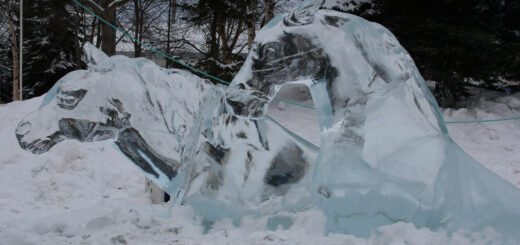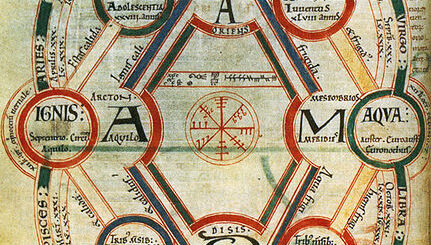A Death Domain Variant for Neutral Clerics
Note: The text of this article, including the Death domain presented here, is designated as Open Game Content. (Click here for the license.)
I
f you’re using a Death domain for clerics in your campaign, chances are that the version you are using explicitly assumes an evil spellcaster. When designers select spells and powers for Death clerics, they are clearly thinking about the needs of Cackling Evil High Priests across the land.
But Odin was a god of the dead. So too were Osiris and Anubis. Gods of death who aren’t evil come up frequently, in fact, in real-world pantheons–and even in fictional ones. (Fritz Leiber’s Nehwon world comes to mind.) In the Vorago, the head of my pantheon is a Neutral god of death and knowledge–a god who uses the ranks of the dead like a giant library, knowing all that the dead know. For all of these gods and all of their clerics, the Evil High Priest’s version of the Death domain may be an odd fit.
What I’ve drafted below is a sketch of what a variant Death domain might look like for Neutral (or even Good) clerics. It isn’t meant as any kind of firm proposal. Feel free to mess with it or make suggestions in the comment fields below the article. If I like any of the suggestions there, I might update the draft here.
First off, guiding principles:
- A cleric of death is different from a cleric of undeath — the latter may be clearly evil, but death itself is natural.
- Accordingly, a cleric of death might be an expert in mortality. Think of the cleric of death as the guy you call when you find a dead body. He reassures the living, diagnoses cause of death, prepares the body for eternal rest, and so forth.
- A cleric of death might actively oppose undead. When all of the other clerics get alternatives to Turn Undead, the cleric of death might get better at Turning Undead.
- A cleric of death might become expert at knowing how to cause death, or how to forestall death, or at knowing why people fear death.
Next, domain spells:
| 1st | False life, bane |
| 3rd | Gentle repose, darkness |
| 5th | Speak with dead, fear |
| 7th | Death ward, phantasmal killer |
| 9th | Antilife shell, dispel evil and good |
Boldfaced spells are from the existing evil model. Bane is envisioned here as a low-key, subtle way to nudge someone toward his or her ultimate fate–the sniffles version of afflicting someone with Final Destination. Phantasmal killer in the above case might be envisioned as subjecting a person to a premonition of his or her future death so vivid that he or she might die early, fate fulfilled. Assume that afterward, the person cannot remember what the portended fate was–just the feeling it created.
Additional Domain Powers by Level

by Colleen O’Dell. Public Domain.
Edit: The second- and sixth-level abilities have been switched according to the suggestion by reader Tenebrous Rex.
BONUS PROFICIENCIES
At first level, death clerics gain proficiency in the Investigation and Medicine skills, as well as proficiencies in Herbalism Kits and Alchemist’s Supplies. Whenever those skills are used on the dead for diagnostic or investigative purposes, death clerics double their proficiency bonus.
CHANNEL DIVINITY: LAY TO REST
At second level, a death cleric can expend a use of Channel Divinity to create a 30-foot-radius aura centered on the caster for one minute or for as long as concentration is maintained, whichever comes first. No dead characters within the aura can rise as any kind of undead.
IMPROVED TURNING
At sixth level, death clerics double their proficiency bonus when calculating the Wisdom DC for their Turn Undead ability.
MORTAL STRIKE
Starting at eighth level, when attacking with a melee or ranged weapon, the cleric adds 1d8 additional poison damage for one attack per turn.
MORTICIAN, HEAL THYSELF
Starting at 17th level, when the cleric suffers damage or circumstances that would normally result in his or her death, the cleric can, on the next turn, spend a spell slot of 3rd-level or higher to cast revivify on himself or herself, even if that spell has not been prepared. This ability cannot be used again until the cleric completes a short or long rest.
♦ Graham Robert Scott writes regularly for Ludus Ludorum when not teaching or writing scholarly stuff. Graham has also written a Dungeon Magazine city adventure titled “Thirds of Purloined Vellum” and a fantasy novella titled Godfathom. Like the Ludus on Facebook to get a heads-up when we publish new content.













Aside from flipping the 2nd-level and 6th-level benefits, this proposed variant seems spot-on. It’s a much better player option for non-evil characters. Well done. 🙂
Yeah, I can see the Wisdom in flipping those two around. Flip away! 🙂
Dislike losing the martial weapons. I liked the original Death Domain better. I think some DMs are just not thinking when they forget neutral Death Gods. Honestly raising undead isn’t always evil in some worlds and religions. I really like the Priests of Rathma/Necromancers from Diablo 3. They raise undead but not intelligent ones and they are very neutral and self controlled types. They don’t seek to become undead themselves but they do use the undead to further the goals and beliefs of their priesthood it seems.
Looking to make a LN Death Cleric and this seems like a good build. My DM has allowed me the use of martial weapons feat so I’ll get to use a Sickle as my primary weapon, and could use a scythe – but DM wants to come up with a stat table for one (not in 5e it seems). I’m certain he will like the differences in Channel Divinity at 2nd level (Lay to rest seems more ‘good’ than Touch of Death) and the use Poison damage instead of Necrotic at 8th level. Thanks for this Build!